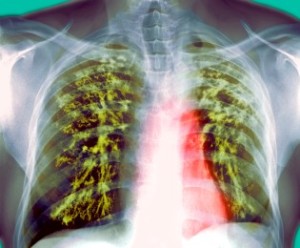- Home
- Editorial
- News
- Practice Guidelines
- Anesthesiology Guidelines
- Cancer Guidelines
- Cardiac Sciences Guidelines
- Critical Care Guidelines
- Dentistry Guidelines
- Dermatology Guidelines
- Diabetes and Endo Guidelines
- Diagnostics Guidelines
- ENT Guidelines
- Featured Practice Guidelines
- Gastroenterology Guidelines
- Geriatrics Guidelines
- Medicine Guidelines
- Nephrology Guidelines
- Neurosciences Guidelines
- Obs and Gynae Guidelines
- Ophthalmology Guidelines
- Orthopaedics Guidelines
- Paediatrics Guidelines
- Psychiatry Guidelines
- Pulmonology Guidelines
- Radiology Guidelines
- Surgery Guidelines
- Urology Guidelines
Cornell discovery holds potential for treating tuberculosis

ITHACA, N.Y. - A recent discovery by Cornell University researchers could lead to a new, effective treatment for persistent tuberculosis infections.
Brian VanderVen, assistant professor of microbiology and immunology, along with colleagues at Cornell's College of Veterinary Medicine have discovered a key metabolic mechanism in Mycobacterium tuberculosis (Mtb) bacteria, which could lead to new drugs for treating tuberculosis. The findings are published in the journal eLife.
Mtb, which currently infects nearly 1.5 billion people worldwide and causes more than 1 million deaths each year, requires host lipids -- cholesterol and fatty acids -- to maintain infection. This is considered a defining characteristic of this pathogen, and is thought to support the bacterium's ability to persist for long periods of time in hosts during both latent and active infections.
The mechanisms of how Mtb assimilates the host's fatty acids has remained a mystery -- until now. Using a genetic screen, VanderVen and his team identified genes involved in cholesterol metabolism. This identified the gene LucA. To tease out what the LucA protein does, VanderVen's team created a novel LucA Mtb mutant, which revealed that the protein encoded by the gene LucA is an integral membrane protein required for fatty acid and cholesterol uptake in Mtb. Further work determined that LucA interacts with subunits of specific proteins in the Mce1 and Mce4 complexes, which import fatty acids and cholesterol, respectively. Specifically, LucA stabilizes the transporters -- acting as an integral linchpin that, if removed, causes Mce1 and Mce4 to fall apart.
"Our data highlights the complexities and weaknesses of a highly successful intracellular pathogen," said VanderVen. The discovery sheds new light on how Mtb metabolizes fatty acids and cholesterol, and also firmly establishes that LucA is required for full virulence of Mtb in vivo, and is therefore is a novel drug target in Mtb.
The next step for VanderVen and his team will be to investigate drugs that inhibit LucA. "This is ideal, because LucA is a bottleneck and inhibiting this protein with a chemical could disable two pathways at a time," said VanderVen. As it happens, "we already have discovered chemicals that do just that, so the next step will be to begin refining these as potential therapeutics."
Read the full article click on the link : https://doi.org/10.7554/eLife.26969.001

Disclaimer: This site is primarily intended for healthcare professionals. Any content/information on this website does not replace the advice of medical and/or health professionals and should not be construed as medical/diagnostic advice/endorsement or prescription. Use of this site is subject to our terms of use, privacy policy, advertisement policy. © 2020 Minerva Medical Treatment Pvt Ltd